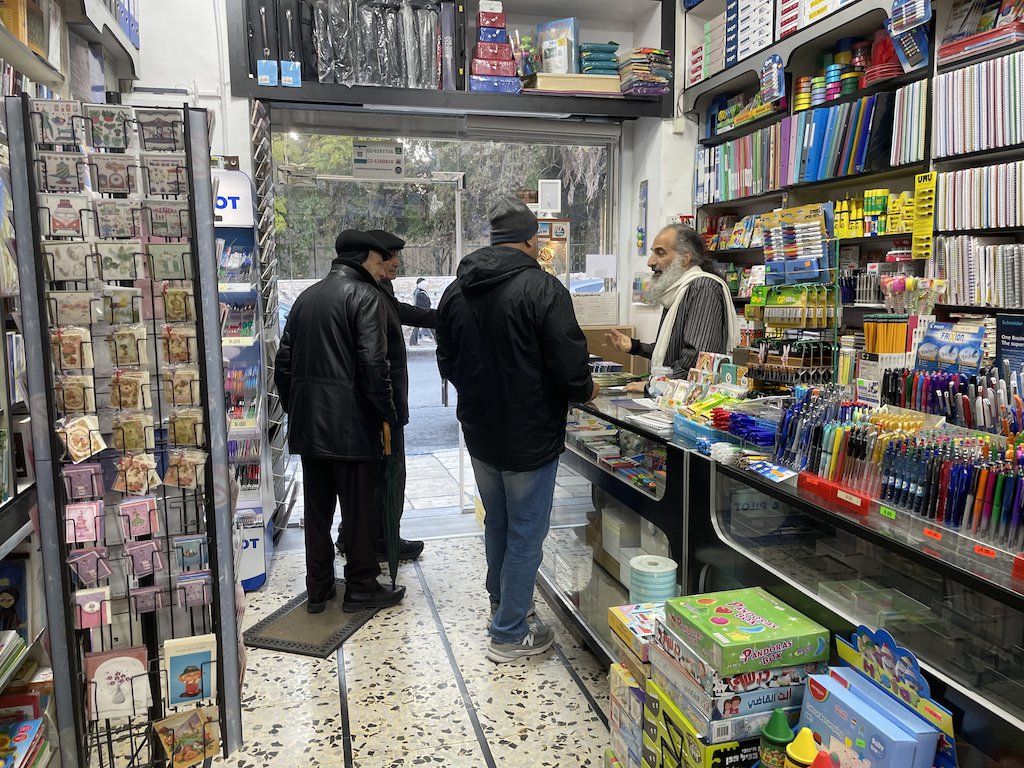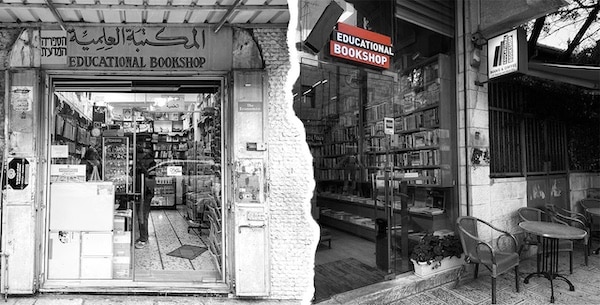On February 9, plainclothes police officers in Jerusalem simultaneously raided two storefronts of the Educational Bookshop, confiscating books and detaining co-owner Mahmoud Muna and his nephew, Ahmed, for two days.
The bookstore, whose two storefronts focus on English and Arabic titles respectively, is well known for its expansive nonfiction offerings, including literature related to the Israeli-Palestinian conflict. The storefronts face each other on each side of Salah al-Din Street, a central shopping and commerce district adjacent to the Old City in East Jerusalem. The Muna family, including Mahmoud and his brothers, Iyad and Murad, have become fixtures of the local community for their stewardship of the bookstore, which hosts a variety of literary and cultural events and is frequently visited by international politicians, diplomats, and non-governmental organization workers stationed in Israel and Palestine.
While the Israel Police circulated a photo of a children’s coloring book titled From the River to the Sea on X as evidence of incitement, the pair were formally accused of “disturbing the peace,” a charge that has been criticized by Israeli human rights groups as vague, subjective and used disproportionately against Palestinians.
Iyad witnessed the police search the Arabic-language bookstore and recounted watching officers pull books off shelves and inspect each cover before tossing the books on the floor. At some point, the police officers began using Google Translate on their smartphones to translate Arabic as they carried out the inspection.
“When they found a book that has, for example, a picture of a Palestinian, or a picture of a V [a hand-gesture symbolizing victory] or a keffiyeh, they were Google translating and putting it aside like, ‘This can be something that we need,’ ” Iyad explained.
One of the [confiscated] books was only paintings of the Dome of the Rock. [A police officer] looked at it, and he was almost convinced that it was OK. Then he looked at the back, and he sees a Palestinian flag. He says, ‘Oh no, this is wrong.’ So he put it in the bag to take it with him.
The police proceeded to search each bookstore’s office and storage spaces. One police officer emerged from the Arabic bookstore’s office holding the English edition of Haaretz, a mainstream Israeli newspaper.
“On the cover was the picture of the release of the Israeli prisoners next to the Hamas guys. It was a big picture. He brought it to me and said, ‘Look, this is Hamas newspaper,’ ” Iyad recounted.
I asked them, ‘How come?’ He pointed to the H. He didn’t understand English.
Beneath Haaretz and other newspapers on the office desk, according to Iyad and Murad, was the sample of From the River to the Sea, an educational coloring book by South African illustrator Nathi Ngubane. In a statement accompanying the photo of the book posted on X, the Israel Police referred to From the River to the Sea as “a children’s coloring book with nationalist content,” and that they had “arrested two individuals suspected of selling books containing incitement and support for terrorism.”
“We have only one copy of the coloring book,” said Murad.
It was in the back office, and the book wasn’t for sale.
The Educational Bookshop was founded in 1984 by Ahmad Muna, beginning with an Arabic bookstore before expanding into English offerings. The stores are now operated by his children—including Mahmoud, Iyad, and Murad—and their families. In addition to the stores on Salah al-Din Street, the Munas also operate a smaller branch inside the nearby American Colony Hotel, a luxury accommodation popular with visiting heads of state, politicians, foreign correspondents, and celebrities. The English-language storefront is its largest, and is equipped with a cafe and event space where Mahmoud frequently hosts book launches and lectures. The bookshop is popular with tourists and is a mainstay stop for both groups offering both dual narrative and Palestinian-led tours in Jerusalem.

Iyad Muna speaks with customers in the Educational Bookshop’s Arabic-language storefront in Jerusalem. (Photo: Abby Seitz)
Omar Haramy, the executive director of a Palestinian Christian liberation theology non-profit called Sabeel, says he brings international groups to the Educational Bookshop because “it’s the one place that has the mosaic of stories in Jerusalem.”
“It’s a place that shares narratives of so many different people,” says Haramy.
You can find books by former Israeli presidents there. It’s one of the very few places where internationals, Palestinians, Israelis, expatriates, diplomats, all people meet to drink coffee, to talk, to discuss, and to debate . . . . All of these conversations end with people agreeing and disagreeing with each other, which is what civilized people do.
In addition to the two Educational Bookshop branches, three other Palestinian-owned bookstores in East Jerusalem have been searched over the past few weeks. On January 31, police searched two Palestinian-owned bookstores on Chabad Street in the Old City, arresting owner Hisham al-Ekirmawi and ordering him to close his shop, Al-Quds Library, for one month. On February 10, the day after arresting Mahmoud and Ahmed Muna, police searched and photographed a fifth bookshop in East Jerusalem. The owners declined to comment and requested the store’s name not be published due to fear of retaliation.
“[The police] are targeting the culture and knowledge of Palestinians in Jerusalem,” Murad said.
The searches have put other Palestinian booksellers on edge. At another store nearby, an employee explained that as soon as their owners heard what happened at the Educational Bookshop, they temporarily removed any books, jewelry, and stationery with Palestinian flags or other symbols that Israeli police could deem problematic.
Palestinian cultural institutions in Jerusalem—including the Palestinian National Theatre, the Jerusalem Society for Music Teaching and Research, the Edward Said National Music Conservatory, and Yabous Cultural Center—have long been subjected to raids, arrests, property damage, and closures. While the Educational Bookshop operated for forty years before being targeted by police, Iyad understands the raid as part of a larger pattern of cultural oppression in Jerusalem.
“Every so often [the police] choose a cultural center or something that’s known for cultural events and activities, and they attack them,” says Iyad.
They’re trying to make us afraid of them. I don’t know what they all want or what they don’t want, because at the end, they didn’t find anything. I mean, we have been in business for forty years. We know what we are doing . . . . We know which books are going to sell well, and we know what good books should be sold. We never bring a book that makes problems . . . . We are trying to open bridges between people.
Murad echoed his brother’s steadfast sentiments.
“We exist, and we will continue to exist,” says Murad.
We know what we are doing. We are paying a hard price and a big price for our knowledge. We will keep going. We will not stop. We are not afraid, because we know we are right.
Abby Seitz is an American freelance journalist based in Jerusalem who covers Israel/Palestine.

